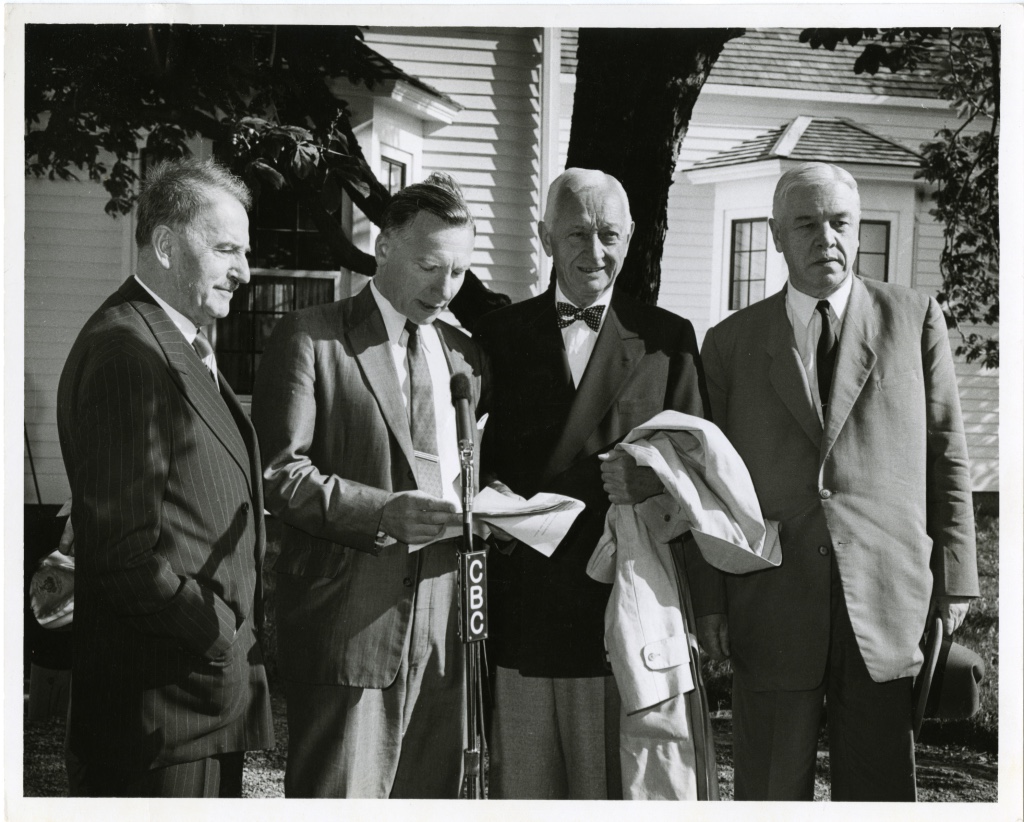STATEMENT OF INTERNATIONAL MEETING OF
SCIENTISTS AT PUGWASH, CANADA, July 1957
(For release at 4:00 pm., July 11th, 1957)
The enclosed statement was unanimously adopted by the scientists whose names are below, who met in the conference convened by Earl Russell at Pugwash, Nova Scotia, Canada, between July 7-10, 1957:
Australia Professor M.L.E. Oliphant
Austria Professor H. Thirring
Canada Dr. G. Brock Chisholm
China Professor Chou Pei Yuan
France Professor A.M.B. Lacassagne
Great Britain Professor C.F. Powell
Professor J. Rotblat
Japan Professor I. Ogawa
Professor H. Yukawa
Professor S. Tomonaga
Poland Professor M. Danysz
USA Professor D.F. Cavers
Professor H.J. Muller
Professor P. Doty
Professor E. Rabinowitch
Professor W. Selove
Professor V.F. Weisskopf
USSR Professor A.M. Kuzin
Academician D.V. Skobeltzyn
Academician A.V. Topchiev
STATEMENT
At the invitation of Lord Russell, and through the generous hospitality of Mr. Cyrus Eaton, a group of scientists, drawn from ten nations and widely representative of different political, economic and other opinions, met in Conference at Pugwash, Nova Scotia, between July 7 and 10, 1957. Mr. Y. Shimonaka and others also provided valuable assistance.
The meeting originated in the suggestion, contained in the Russell – Einstein appeal, that scientists should meet to assess the perils to humanity which have arisen as a result of the development of weapons of mass destruction. Two years have passed since that statement was issued but the dangers remain. In fact, the stockpiles of nuclear weapons have increased, new nations have joined the ranks of those producing weapons, or trying to produce them, whilst serious misgivings have been expressed as to whether the continued testing of such weapons may not result in damage to the population. The general belief that a full-scale nuclear war would bring universal disaster upon mankind, and the recognition that it is technically possible for both the two great contending forces to visit any desired degree of destruction upon an enemy, as well as certain political developments, have created an atmosphere in which it was possible for us to meet, and to discuss dispassionately, many important and highly controversial issues.
The international problems which have arisen as a result of the development of atomic energy are of two kinds, technical and political. A gathering of men of science can discuss with special competence only the scientific and technical implication of atomic energy. Such discussion, however, can be fruitful only if it takes into account the political problems which are the background to international negotiations. The signatories of the Russell-Einstein appeal affirmed their intention to say nothing which might seem to favour one rather than the other of the two great groups of powers into which the world is divided. In attempting to formulate the conclusions which followed from our discussions, we too have tried to avoid any exacerbation of the differences between nations which might follow, for example, from emphasis on technical considerations unwelcome to one or other of the two groups of powers.
Men of science are now well aware that the fruits of their labours are of paramount importance for the future of mankind, and they are thus compelled to consider the political implications of their work. Their opinions on politics are as diverse as those of other men. These facts make it difficult for a conference such as the present to issue an agreed statement on matters which are controversial. The discussion of such issues, however, allowed the points of difference and the areas of agreement to be defined, and led to a measure of mutual understanding of the opinions of one another.
The main work of the meeting was centered round three principal topics: (1) the hazards arising from the use of atomic energy in peace and war; (2) problems of the control of nuclear weapons; and (3) the social responsibility of scientists. Three committees were established to give detailed consideration to these topics. Their reports to the conference are given in the statements appended to this document, but the principal conclusions bearing on the hazards of atomic energy may be briefly summarized as follows:
Committee I on nuclear hazards, made an independent assessment of the effects of the nuclear tests carried out hitherto. From the details given in the appendix, it may be seen that the hazard, compared with others to which mankind is subject from natural causes, is small. Nevertheless, because of the worldwide distribution of fission products, and the fact that some areas may be subject to effects much above the average, close attention to the dangers should be maintained, especially if tests of bombs which give large radioactive fall-out continue to be made.
The committee also considered the hazards arising from the peacetime use of industrial atomic power, or the application of radiations in medicine and industry. Although these hazards must be viewed in the light of the great benefits which will flow from such applications, means of greatly reducing the attendant hazards are available and should be widely adopted.
The above-mentioned estimates of the hazards which have arisen from test explosions permitted a closer examination to be made of the probable consequences of an unrestricted nuclear war. This examination led to the unquestioned conclusion that a general war with nuclear weapons would indeed represent a disaster of unprecedented magnitude. The radiological hazards would be thousands of times greater than those due to the fall-out effects of test explosions. In the combatant countries, hundreds of millions of people would be killed outright, by the blast and heat, and by the ionizing radiation produced at the instant of explosion, whether bombs of the so- called “clean” or “dirty” kind were employed. If “dirty” bombs were used, large areas would be made uninhabitable for extended periods of time, and additional hundreds of millions of people would die from delayed effects of radiation from local fall-out, some in the exposed population from direct radiation in jury, and some in succeeding generations as a result of genetic effects. But even countries not directly hit by bombs would suffer through global fall-out, which, under certain conditions, might be of such intensity as to cause large-scale genetic and other injury.
It is against the background of the fearful consequences for humanity of a general war with nuclear weapons that the conclusions of Committee II, which considered problems of control, must be viewed. The principal objective of all nations must be the abolition of war and the threat of war hanging over man kind. War must be finally eliminated, not merely regulated by limiting the weapons which may be used. For this purpose, it is necessary to reduce tension among the nations; to promote mutual understanding among the peoples; to strive for the ending of the arms race; and to provide an adequate control system so as to give substantial protection, and permit the development of mutual confidence.
One of the greatest difficulties in international affairs in recent years has sprung from the fact that in a period of delicate strategic balance, even secondary questions acquire strategic significance; in such a situation, they are rarely subject to agreed solutions because any particular solution appears to be to the strategic advantage of one rather than another of the powers. We believe that it is unrealistic to depend upon any sudden increase in mutual confidence, and that it is more likely to grow from small beginnings. In this situation, even small agreements covering limited fields could be of great importance.
In the present circumstances, we believe that the greatest peril comes from the possibility that a war might break out between two smaller nations, that Russia and America might intervene militarily on opposite sides, and that such a war might be fought by using atomic bombs in combat. We believe it would be very difficult to limit a local war of this kind – particularly if it is fought with atomic weapons in the tactical area – and that what may start out as a local war may end as a general atomic catastrophe. In order to avert this danger, political settlements aimed specifically at eliminating the risk of the out break of a local war between smaller nations are needed.
The conclusions of Committee III on the responsibilities of scientists state our common conviction that we should do all in our power to prevent war and to assist in establishing a permanent and universal peace. This we can do by contributing to the task of public enlightenment concerning the great dilemma of our times; and by serving, to the full extent of our opportunities, in the formation of national policies. The Committee gives a statement of beliefs and aspirations suitable for scientists in the modern world.
Finally, we should like to give expression to the high degree of unanimity we have found among all the members of the Conference on fundamental aims. We are all convinced that mankind must abolish war or suffer catastrophe; that the dilemma of opposing power groups and the arms race must be broken; and that the establishment of lasting peace will mark the opening of a new and triumphant epoch for the whole of mankind. We earnestly hope that our conference may make a modest contribution to these great aims.

